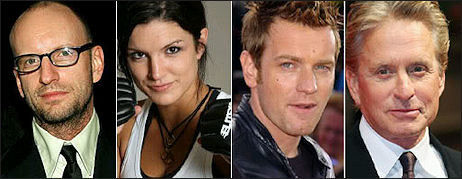Steven Soderbergh‘s Haywire (formerly Knockout), a spy thriller starring mixed martial arts champion Gina Carano, Ewan McGregor, Michael Douglas, Michael Fassbender, Channing Tatum, Antonio Banderas and Bill Paxton, was research-screened last night at the Arclight Sherman Oaks, with Soderbergh in attendance. A guy I know and trust was there, and has shared some positive impressions.

(l. to r.) Soderbergh, Carano, McGregor, Douglas. (Art stolen from
The Playlist.)
“Mallory Kane (Carano) is young, tough, beautiful, determined, and a freelance covert operative. She is hired out by her handler, Kenneth (McGregor), to various global entities, to perform jobs which governments can’t authorize and heads of state would rather not know about.
“For all her looks and youth, Mallory is still the best in her field, and her skills are in constant demand. But when one of her operations goes awry, Mallory needs to use all her skills, tricks and abilities to escape an international manhunt, make it back to the United States, protect her family, and exact revenge on those that have betrayed her.
“The associations that came to mind were (a) any Bourne movie, (b) any Mission Impossible movie, (c) Taken, (d) Michael Clayton, (e) Wanted, (f) Panic Room, (g) Obsessed, (h) The Informant, (i) Body Of Lies, (j) Edge Of Darkness and (k) Red Eye.
“First and foremost for me were the strong parallels to The Girlfriend Experience. There are lots of closeups of our female lead, who’s no actress but whose skills in her field probably make her more interesting than a star in the role. And there’s an almost complete lack of affect on her part, and yet, for me, a lot of engagement in her situation.
“Another GE current, unlike most big thrillers, is Soderbergh’s focus on the nuts and bolts of the situation. This is what creates and sustains the drama — how does one get out of, or in to, situations like these? For me ‘reality’ is much more interesting than movie fiction.
“The fights are great. I’ve been in, and have personally choreographed, a lot of staged violence, and this was quality stuff. It does my heart good to see a young woman really kick ass. The brutality and desperation of the fights, in fact, at times seemed to appall more than thrill the audience, which is as it should be. As I write this (i.e., the following morning) I’m still thrilled.”
The screenplay is by Soderbergh’s Limey collaborator Lem Dobbs. The Lionsgate film is reportedly slated for a January 2011 release.



